The Commission Against Corruption (CCAC) announced yesterday two separate scams its graft busters uncovered in February and November last year involving a security company, in which several of the firm’s supervisor and security guard team leaders conspired to instruct their subordinates to falsely clock in at several public entities during the same working hours, or impersonating those who were on leave or who had left the company to report to work at the Public Security Police (PSP) and the Health Bureau (SSM), defrauding the two entities out of over 5.39 million patacas in total.
The CCAC published yesterday its 2023 Annual Report, revealing a string of criminal cases committed by government-outsourced company workers and public servants.
According to the report, the CCAC received a dozen anonymous reports about the security company whose staff were working at the city’s border checkpoints that was defrauding public entities. A CCAC investigation of the first case found that a supervisor of the company conspired with a number of security guard team leaders to instruct their security guards on duty at a checkpoint to falsely clock in and clock out at two or even three public entities at the same time, or immediately after working hours. The security guard supervisor and team leaders, the report highlighted, pretended to be security guards who were on leave, had left the company or were on duty at other checkpoints to carry out false sign-ins on the forms provided by the Public Security Police and the Health Bureau, creating the illusion that the number of security guards met the contract requirements, cheating the two entities out of more than 3.09 million patacas.
The report quoted the investigation of the second case as revealing that in the course of the company’s provision of services to the Health Bureau at the city’s checkpoints, the firm’s management and security guards had caused the bureau a loss of more than 2.3 million patacas by adopting a similar modus operandi as in the first case.
Both cases involving fraud, document forgery and computer forgery have been transferred to the Public Prosecution Office (MP) for follow-up investigation, the report noted.
Moreover, upon receiving reports that a number of local cleaning companies and security companies, in order to obtain more quotas for the employment of non-resident workers (NRWs), submitted to the Social Security Fund (FSS) hundreds of inaccurate data on the employment of local residents and paid social security fees for them, the graft-busters also uncovered that a company’s applications for the renewal of NRW positions for as long as five years had all along failed to meet the minimum requirement of the number of local residents to be employed, but the renewal was still approved by the Labour Affairs Bureau (DSAL). The report pointed out that as no criminal offence was found in the case, it was merely referred to the Labour Affairs Bureau to follow up on the issue of non-compliance concerning the NRW hiring requirements.
No. of govt-subsidy scams drops ‘significantly’
Meanwhile, the report noted that the CCAC investigated a total of 249 cases last year, of which corruption and ombudsman cases accounted for 102 and 123 respectively. In addition, 24 cases were investigated at the request of law enforcement agencies outside Macau, while 387 cases were investigated or referred to authorised departments for follow-up action.
Last year, according to the report, the CCAC received 701 complaints and reports, of which 57 percent were lodged online, 411 with real names and 265 anonymously, while about 94 percent of last year’s cases were being followed up electronically.
The CCAC pointed out that there was a “significant” decrease in the number of government subsidy scams last year as compared with 2022, “believing that the growth of such types of cases was temporarily suppressed due to the strategies of encompassing vigorous crackdowns, system building and public awareness and education activities.”
This undated handout photo released by Macau’s anti-graft body yesterday shows Commissioner Against Corruption (CCAC) Chan Tsz King (left) handing his 2023 Annual Report to Chief Executive Ho Iat Seng.








